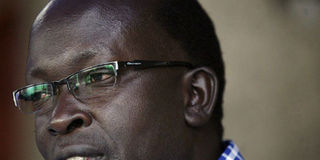ICC claims the first right to try Barasa

Kenyan journalist Walter Barasa speaking in Nairobi during a press conference. The ICC prosecutor's office has said the court has the first mandate to try the journalist as the principle of complementarity does not apply to his case. PHOTO/FILE
The International Criminal Court (ICC) prosecutor’s office has said the court has the first mandate to try journalist Walter Barasa as the principle of complementarity does not apply to his case.
A statement released yesterday said Mr Barasa’s case involved a crime directly punishable by The Hague-based court and that the ICC judges would retain the right to continue pursuing the case.
The principle of complementarity does not apply to proceedings under the Rome Statute where a person is accused of corruptly influencing a witness or obstructing or interfering with the attendance or testimony of a witness, as the ICC has jurisdiction over such offences if committed intentionally, according to the Office of the Prosecutor.
The principle of complementarity states that the ICC can only come in as the last resort where states have failed to establish a local mechanism to deal with crimes committed or are unwilling to do so.
The ICC issued an arrest warrant against Mr Barasa, a Kenyan journalist, early this month for “corruptly influencing or attempting to corruptly influence ICC witnesses.” ICC Prosecutor Fatou Bensouda has accused him of bribing or attempting to bribe witnesses testifying in the case against William Ruto.
That is one of the offences listed in the Rome Statute to shield the court’s processes from interference.
The Rome Statute states that the Court “shall have jurisdiction over” the offences against its administration of justice when committed intentionally.
Mr Barasa has since moved to the High Court in Kenya to challenge extradition to the Netherlands to face the charges.
His lawyers argue that he should be tried in Kenya under the principle of complementarity.





